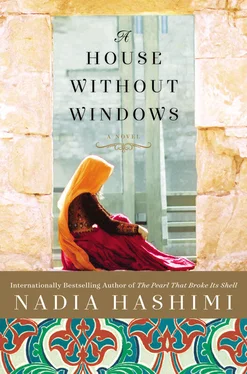But when people were desperate enough, they’d turn even to a suspected spy if it meant putting food back on their tables or saving the life of a child.
Gulnaz had watched her father puff from the attention of the townspeople. Visitors would come to their home, arms laden with gifts, and cry their woes to the murshid . He would listen to them, cup his hands in supplication with them. And then, as if a broken pipe had been soldered back together, the murshid ’s prayers would restore life and hope.
It was not surprising that his body aged at a different pace than those around him. The unending pleas from neighbors, the scandalizing rumors, and the strife within the family compound weighed heavily on him. Prestige was a blessing and a beast.
Her father had never believed that people actually gave weight to the superstitions about green eyes. He would smile softly and brush his daughter’s hair from her eyes.
“These eyes? How could anyone think these eyes would bring anything but joy? Nazar is born from a lack of faith. It is something that exists where God does not. Your eyes are not the source of nazar, Gulnaz. Everyone in our village should know better than to think that.”
But they didn’t know better. Gulnaz and her mother kept out of sight when visitors called upon the murshid, which they did nearly daily. Gulnaz would hide in the courtyard of their home and watch as his magic unfolded. When she was nine or ten, she became more curious as to what her father did that had people leave looking so comforted, as if a burden had been lifted from their shoulders.
She followed one visitor to find out. A man with a basket of eggs was escorted by one of Gulnaz’s cousins, led through the compound at a leisurely stroll, making small talk along the way. In the meantime, another cousin darted around the back of the house, with Gulnaz close behind. He made his way to the room where Safatullah received guests. Breathless, he told the murshid about the visitor, the basket of eggs he had brought and his ailing wife.
The man was announced, entering the room with his head bowed and a hand over his heart in respect. The murshid extended a hand in greeting and kissed his guest’s cheeks. From the hallway behind the sitting room, Gulnaz could hear her father clear his throat.
“It is wonderful to see you, my friend, though I wish you would have come under happier circumstances. I sense something troubles you deeply.”
“You’re most right, Safatullah- sahib, ” the man said, his voice gravelly with emotion.
“And what weighs on your mind most doesn’t seem to be what troubles lesser men. You are not here to ask God for more food or more land. No, your heart has no greed. You are here about something far more important.”
“Oh, good murshid ! My soul is bare to you!”
“Your eyes tell your pain. How is your dear wife doing?”
“She is not well, sahib . She grows weaker by the day. The fevers come and go. Her skin and eyes have yellowed. I beg her to eat, but she can’t bring anything to her lips. I fear the children will soon be without a mother, and I don’t know what else to do. We’ve tried all the remedies my elders recommended for us.”
“You must have faith. Allah knows best for you. He will not allow her to suffer this way, not when you have both been such devout people. God is merciful, my dear friend. Let’s make a prayer together. .”
With hands cupped, heads bowed, and shoulders swaying side to side, the men would pray. Gulnaz’s cousin caught a glimpse of her peeking into the room and shooed her away.
Gulnaz was struck by the way her father had spoken, a voice so different from what she was accustomed to. The voice of the murshid was patient, soothing. Her father’s voice was harsher, sometimes angry, other times jovial. It was as if he were two different men, one for his family and one for the townspeople who called upon him for miracles. Gulnaz started to learn from him then. She would hide and listen carefully, her back to the wall and her ears straining to catch every word. She learned the right tone of voice, the right words, when to pause. Some things she added on her own, the tilt of her head, the clasp of her hands. She practiced when no one was around, whispering prayers in the dark before she went to sleep as if she were rehearsing for a day when she would take her father’s place. Only her mother noticed, and she was more amused than anything else.
The more Gulnaz watched her father, the more intrigued she became by the amount of respect he garnered for his simple efforts. People often came back, praising him with more gifts when their prayers had been answered. For those who were not so fortunate, the murshid offered gentle explanations and guided them through their sadness. The poor man with the basket of eggs came back devastated when his wife succumbed to her illness.
“You see, my friend. Allah did not allow her to suffer. Allah knows best and will take care of your children. Let’s pray together for your children now. .”
And in that way, disquieted hearts were calmed. People found solace. The murshid remained beloved and needed, a pillar of the community. Gulnaz became hungry for the same adoration, the same power. She asked her father if she could sit with him while he received his visitors but he refused. She asked him to teach her how he performed his miracles, how he raised the people’s prayers to God’s ears.
“It’s not a thing that should be taken lightly,” he said, shaking his head. “What I do is not to entertain myself or others. It is not because I want people bowing at my feet. It’s because people are in need of help. They need something that I can offer, and Allah has pointed to me to fill this need. It is not something I chose. It was chosen for me.”
Gulnaz knew he was speaking from his heart. She knew because his voice was abrupt and sharp — it was her father’s voice, not the placating voice of the murshid .
When she tried to pray out loud and within her family compound, she was met with cynical looks from her cousins, aunts, and uncles. They questioned her motives and shook their heads at her attention-seeking. In their skeptical eyes, she wasn’t devout. She was playing with fire.
But Gulnaz wanted to be good. She wanted to look after people the way her father did. She copied his prayers, she mimicked his words. She would pop in and tell relatives that she had prayed for them or for their children.
But when a family refused to give their daughter’s hand in marriage, when a son broke his leg playing soccer, when a woman’s face broke out in hives — they would remember that Gulnaz had stopped by that morning, that week, or even a month ago. She was turned away, politely by some and forcefully by others.
These were the same people who would kiss the murshid ’s hands in gratitude for a simple dua . Gulnaz could not understand why her benevolent gestures were met with such resistance.
“It has nothing to do with your faith,” her mother had explained. “It has everything to do with theirs.”
Gulnaz, at ten years old, had become embittered. It felt as if everything that went wrong was thrown at her feet, even when she kept to herself. Outside her family’s compound, she was not the beloved daughter of the murshid . She was Gulnaz with the dangerous green eyes.
She was meant to do bigger things. She was meant to affect people, she knew. Why couldn’t they see it?
Safatullah told her not to distress herself. Sometimes people needed time to understand what was best for them.
Disappointed, Gulnaz bottled the gifts she believed she’d inherited from her father. But inside of her, they began to boil over and transform into a very different energy. She could not hold it in.
Читать дальше











